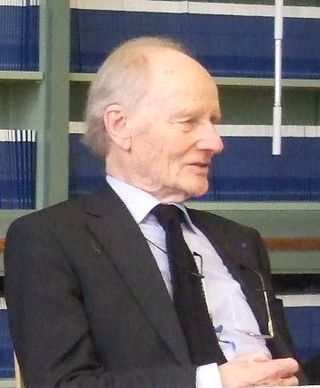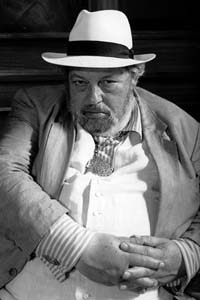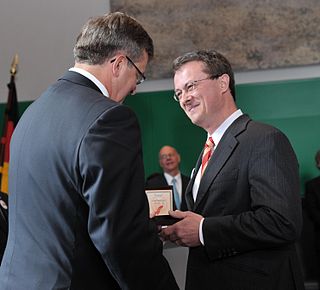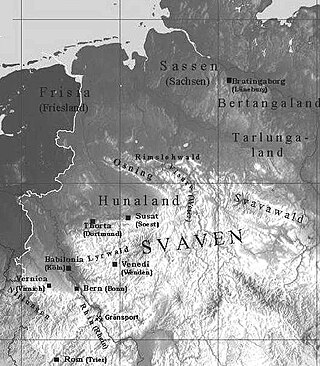
Helmut W. Pesch (born 30 August 1952) is a German fantasy author, illustrator, translator, and publishing editor. He is known as a Tolkien scholar. He won the Deutscher Fantasy Preis in 1982. [1]

Helmut W. Pesch (born 30 August 1952) is a German fantasy author, illustrator, translator, and publishing editor. He is known as a Tolkien scholar. He won the Deutscher Fantasy Preis in 1982. [1]
Helmut W. Pesch was born in 1952. He grew up in Kevelaer on the Lower Rhine, after graduating from high school, he studied English, Art History and Classical Archaeology at the University of Cologne and the University of Glasgow. In 1981 he earned his PhD on the subject "Fantasy: Theory and history of a literary genre". Published in 1982, it was the first study in Germany on fantasy literature. Pesch was awarded the German Fantasy Prize for this in 1982. [1] He is active as an illustrator and cartographer or translator (from English) and as a literary critic and linguist. From 1987 he also worked as a publishing editor for fiction at the Verlagsgruppe Lübbe and had been an editor for digital media at Bastei Entertainment since October 2011, where he was program manager from 2013 until his retirement in September 2015, initially at Bastei Entertainment and from 2014 in the newly founded Content Management department, which deals with material development and crossmedia projects. [2]
Pesch writes that he research interests are fantasy, genre theory, and Tolkien studies. In 1984 he published an anthology for students titled J. R. R. Tolkien, der Mythenschöpfer ("J. R. R. Tolkien: The Mythmaker"); he followed this in 1994 with a volume of his own essays and lectures, Das Licht von Mittelerde ("The Light of Middle-earth"). [2]
Pesch contributed cover pictures and maps to the fantasy series Dragon - Söhne von Atlantis , published by Pabel Verlag KG from 1973 to 1975. He provided the fantasy series Mythor , published by Pabel-Moewig Verlag from 1980, with illustrations and maps. His maps have been used in German editions of the novels of the fantasy author David Eddings.
From 1984, Pesch translated novels by authors including Lloyd Alexander, James Branch Cabell, Eric Rücker Eddison, Brian Lumley, Dennis L. McKiernan, Naomi Mitchison, John Myers Myers, Diana L. Paxson, Tom Shippey, J. R. R. Tolkien, Joan D. Vinge and Catherine Webb from English to German. [3] His translation of Dennis L. McKiernan's Drachenkampf (originally Dragondoom) was nominated for the Kurd-Laßwitz-Preis 1993 and voted sixth place there. [4]
He has edited novels by Ken Follett and David Baldacci, Stephen King, Peter Berling, Johannes K. Soyener and Wolfram zu Mondfeld, Thomas Gifford, Andreas Eschbach and Wolfgang Hohlbein. [2]
Pesch started writing in the late 1960s, and wrote some fan stories in the early 1970s. After that he worked mainly in the field of translations and theoretical work with fantasy, which inspired him to write a total of five novels, some together with Horst von Allwörden . [2]
Pesch is considered an expert on Tolkien. In 1984 Corian-Verlag published his J. R.R. Tolkien. The Creator of Myths, a critical anthology of Tolkien's work. He is the author of articles such as J. R. R. Tolkien's Linguistic Aesthetics, Tolkien 2001. An Inventory and A World of Language. On the concept of language in J. R. R. Tolkien. He edited the German edition of Robert Foster's The Complete Guide to Middle-earth .
Elderland Saga
Anderswelt Trilogy
The works of J. R. R. Tolkien have generated a body of research covering many aspects of his fantasy writings. These encompass The Lord of the Rings and The Silmarillion, along with his legendarium that remained unpublished until after his death, and his constructed languages, especially the Elvish languages Quenya and Sindarin. Scholars from different disciplines have examined the linguistic and literary origins of Middle-earth, and have explored many aspects of his writings from Christianity to feminism and race.

Mark Benecke is a German forensic biologist.

Robert Spaemann was a German Catholic philosopher. He is considered a member of the Ritter School.

Peter Berling was a German actor, film producer and writer. He has worked on several occasions with director Werner Herzog, among them his collaborations with actor Klaus Kinski like Aguirre, the Wrath of God, Fitzcarraldo and Cobra Verde.
Géza von Cziffra was a Hungarian and Austrian film director and screenwriter.
Translations of J. R. R. Tolkien's The Lord of the Rings have been made, with varying degrees of success, into dozens of languages from the original English. Tolkien, an expert in Germanic philology, scrutinized those that were under preparation during his lifetime, and made comments on early translations that reflect both the translation process and his work. To aid translators, and because he was unhappy with the work of early translators such as Åke Ohlmarks with his Swedish version, Tolkien wrote his Guide to the Names in The Lord of the Rings in 1967.
Georg Heinrich Willem (Wim) Thoelke was a German TV entertainer.
Wolfgang Krege was a German author and translator.
Hellmut Diwald was a German historian and Professor of Medieval and Modern History at the University of Erlangen-Nuremberg from 1965 to 1985.

Wolfgang Stock is a German author, professor and former journalist and managing partner of Convincet, a business consultancy for corporate communications.
Heidi Hassenmüller is a German author who writes young adult literature. In 1989 she was awarded the Buxtehude Bull award for her book, Gute Nacht, Zuckerpüppchen.

Christiane Gohl is a German author who uses the pen names Ricarda Jordan, Sarah Lark and Elisabeth Rotenberg. In addition to writing children's books centered on horses, she is also a novelist.

Gerhard Zwerenz was a German writer and politician. From 1994 until 1998 he was a member of the Bundestag for the Party of Democratic Socialism (PDS).
Wolfgang Hohlbein wrote more than 200 books. All his books are written in German; only 11 of his books have been translated into English. This is the list of all books written by Wolfgang Hohlbein.
Sven Felix Kellerhoff is a German historian, journalist and author who specialises in the history of the Nazi era.
Walter Kolneder was an Austrian musicologist and violist.

Zoë Beck is a German writer, publisher, translator, dialogue book author and dubbing director. She has won multiple awards for her books and translations.

Siegmund Helms is a German musicologist and music educator.

Heinz Ritter-Schaumburg was a German scholar and writer, who developed a hypothesis about the origin of the legends about Dietrich von Bern and the Nibelungs. He postulated that Dietrich von Bern was a historic king ruling in Bonn in Germany, who was later confused with Theodoric the Great. Similarly he proposed that the legendary Etzel was a historic king residing in Soest, who was later confused with Attila the Hun. His hypothesis was either ignored or rejected by most scholars in the field, but gained a relatively large amount of attention in public since 1975.
Willi Voss and sometimes writing under the pseudonym E. W. Pless, is a German writer. In the 1970s he was known as a neo-Nazi and as a PLO member, a procurer of weapons for Palestinian terrorist attacks. He was involved in the Munich Massacre. After defecting from the PLO, he became an informant for the CIA and returned later to Germany. Before becoming a writer, he worked as a laborer, librarian, and journalist.